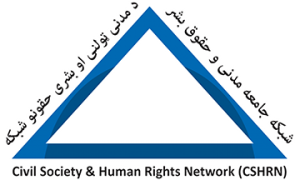From the website of The Danish Institute for Human Rights
 DIHR’s Afghan partner the Civil Society and Human Rights Network is pushing for new legislation to ensure access to information for the Afghan people. Malek Sitez, DIHR’s Afghan expert, argues that such access is a precondition for creating an accountable state in Afghanistan.
DIHR’s Afghan partner the Civil Society and Human Rights Network is pushing for new legislation to ensure access to information for the Afghan people. Malek Sitez, DIHR’s Afghan expert, argues that such access is a precondition for creating an accountable state in Afghanistan.By Brendan Sweeney
Senior Advisor and Programme Manager at DIHR, Malek Sitez, who is responsible for DIHR projects in Afghanistan, has been a vocal critic of developments in this divided country. In the following interview, he explains why the Institute’s main partner in Afghanistan, the Civil Society and Human Rights Network (CSHRN), is pushing for the introduction of new legislation to regulate ordinary people’s access to information.
Q: Why is access to information essential for human rights?
A: Access to information means that citizens have the right to get information concerning civil, political, economic, social and cultural matters from the public administration. It is a principle of good governance that government information – involving the education or health sector, state expenditure, election procedures, and anti-corruption measures – is made available to ordinary people. Some exceptions can be made to this principle such as issues regarding national security or confidential data about individuals, but these exemptions should be as few as possible. Access to information also enables people to directly confront and pressurize the state to make it more transparent and accountable, and to reduce corruption. The state will then be in a better position to fulfill its role and to respect the rights of all the people living under its jurisdiction. That is why access to information is so important for strengthening human rights culture, endorsing democracy and encouraging a culture which fosters the rule of law in society. Worldwide, there is increasing recognition of the importance of access to information and today about 85 countries include provisions in their national legislation to guarantee this right.
 Q: What is the state of access to information today in Afghanistan?
Q: What is the state of access to information today in Afghanistan?
A: In Afghanistan, the right to access to information is enshrined within the new constitution in Article 52. Meanwhile, chapter two of the Afghan constitution guarantees the civil rights and freedoms of Afghan citizens including access to state information. However, no individual legislation has yet been adapted to ensure the implementation of these articles.
Q: What is CSHRN doing to support access to information in Afghanistan?
A: According to the understanding of the Civil Society and Human Rights Network (CSHRN), it is the role of civil society to promote the accountability of the state towards its citizens. For this purpose, CSHRN has launched a project to push for the creation of an act regulating access to information in Afghanistan. CSHRN has been preparing the ground for this during the last few years by sensitizing the Afghan public as well as the state to the importance of access to information through workshops on access to information in 2005 in Kabul and 2007 in Bamyan. In addition, CSHRN identified three major steps in 2009 that need to be taken in order to follow up on this preparatory work, and to push for the inclusion of an access to information act.
Q: Have any of these three steps been implemented?
A: Yes. Concrete work within these three fields has already started. The first step involved developing awareness and understanding about access to information within civil society. The understanding has been further strengthened this year through brainstorming, discussions and dialogues during an analytical symposium in Mazar-e-Sharif on May 1 st 2009 and through ongoing seminars, programs in radio and television and articles in print media. In the second step meanwhile a working group was established to develop a first draft of an access to information act with the support of DIHR. Scholars in the fields of media, national and international legislation, religion, and democracy were selected in August 2009 to form this working group in Balkh province of Afghanistan. The third step involves lobbying for the discussion of the draft law in the parliament and its inclusion in the national legislation. Civil society, national human rights institutions, media, journalist working group, etc. will jointly lobby to promote the draft law and to ensure its treatment in the Afghan parliament.
 Q: Who is involved with the working group?
Q: Who is involved with the working group?
A: The working Group is composed of Mr. Said Mohammad Islami, a scholar in the field of Islam, Mr. Rahim Ibrahimi, journalist, Mr. Taqhi Wahedi, representative of Afghanistan Independent Commission of Human Rights, and Mr. Khalil Zaki, professor of law in Balkh university. They are studying Afghan and international legislation as well as the international experience of providing access to information. The group will also ensure that the topics raised during the analytical symposium from May 09 will be addressed. As CSHRN’s main partner, DIHR will provide international studies and technical assistance to Afghan colleagues to enable them to benefit from the Institute’s international experience and expertise.
Q: What sort of timetable is there for this? When will the first draft of the new access to information act be ready?
A: A first draft is expected to be ready in the first half of 2010. It will be discussed via a sustainable dialogue with the Afghan people through media debates and dialogues with civil society organizations in the northern provinces of Afghanistan and in Kabul. The CSHRN Coordination Office in the northern region will be facilitating the consultation. Then these comments and proposals will be discussed and included in the draft paper. CSHRN will also regularly report about the progress made in relation to access to information.
